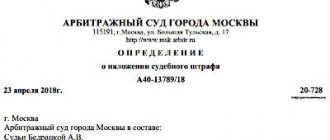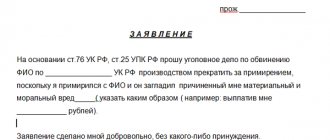Competitiveness of the parties
Definition 1
Adversarialism is one of the principles of the criminal process, which implies equality of the defense and prosecution in court.
The most important principle of the Criminal Procedure Legislation is the principle of confrontation (competition) of the parties in criminal proceedings (Article 15 of the Code of Criminal Procedure). The adversarial principle determines the essence and type of modern Russian criminal proceedings. This principle is based on the provisions of Part 3 of Article 123 of the Constitution of the Russian Federation, according to which trials in the Russian Federation are conducted on the basis of adversarial and equality of parties.
It is worth noting that the principle of adversarialism in criminal proceedings is based on division, divergence of opinions between the defense and the prosecution in the process of resolving a particular issue or problem. The law establishes that the same participants in criminal proceedings cannot take different sides in criminal proceedings. Procedural-criminal functions are understood as a set of rights and obligations of participants in a criminal process, determined by the purpose of their participation in the case, their role in the criminal process, and also determining the direction of the activities of some specific subjects of the criminal process.
Are you an expert in this subject area? We invite you to become the author of the Directory Working Conditions
Note 1
In general, competitiveness of the parties involves ensuring equal procedural rights and opportunities for the parties to protect their interests, prove their claims and express certain claims.
The adversarial nature of the parties also means that no party can have an advantage in the process of proof, statement, or satisfaction of a petition, and no arguments of the parties can have predetermined force.
So, the content of the adversarial principle in criminal proceedings is as follows:
- complete separation of the prosecution and defense in resolving a criminal issue between various participants in the criminal process;
- strengthening the role of the court in the criminal process, freeing it from accusatory prejudices;
- equal degree of implementation of the adversarial principle at all stages of criminal proceedings.
Legislation on criminal disputes
Criminal liability –
regulated by the Criminal Code of the Russian Federation. Criminal punishment is applied only by court verdict.
If criminal legislation has the form of a single codified act, as a rule, it contains a General and a Special part. The General Part includes norms that establish the basic principles and other general provisions of criminal law: concepts and definitions associated with its basic institutions, a list of types of punishments, etc. The norms of the General Part, as a rule, are of a regulatory nature: these are declaration norms , norms-prescriptions, norms-definitions; Some of these regulations are incentive or permissive in nature.
Criminal law
- Norms-prescriptions that establish normative definitions of concepts related to the field of criminal law (“crime”, “punishment”) or contain generally binding rules of behavior.
- Norms-permissions that determine the extent of a person’s possible behavior within the framework of established regulations.
- Prohibition norms establishing the inadmissibility of committing certain socially dangerous actions under pain of punishment.
- Norms-incentives that stimulate a person to perform certain actions.
Realization of state interest in criminal proceedings
The state, within the framework of the criminal process, implements interrelated but relatively separate functions. Through the investigative bodies it carries out an investigation, through the prosecutor it supports the prosecution, through the court it resolves the case.
The state's interest is not to win the case at any cost, to initiate proceedings against a person whose guilt is doubtful, or to convict him. The key task is to ensure the rule of law at all stages of the case so that the innocent are not convicted and the guilty receive fair punishment. Achieving the set goals is impossible without establishing the truth, a comprehensive, objective and complete study of the collected evidence.
Detention and imprisonment in a criminal dispute
Detention, as deprivation of liberty without a court decision, is applied for a period of no more than 48 hours. It is usually combined with other measures, such as a personal search, examination, examination, and fingerprinting. At the same time, law enforcement agencies often use physical force.
When detained, the entire course of the criminal case is influenced by the behavior of the detainee himself. Without a lawyer, it is highly recommended to follow Article 51 of the Constitution of the Russian Federation and not testify against yourself, since according to Art. 14 of the Code of Criminal Procedure of the Russian Federation “On the presumption of innocence”, the accused is considered innocent until his guilt in committing a crime is proven in the manner prescribed by the Code of Criminal Procedure of the Russian Federation and established by a court verdict that has entered into legal force. Otherwise, there is a risk of a significant increase in liability, including imprisonment.
At this stage, a preventive measure is chosen. The detainee has the right to write a petition asking not to be detained during the investigation. In this case, you should attach documents confirming the presence of children, positive characteristics, etc.
A lawyer will help you appeal the decision to initiate a case, formulate a position and mitigate the preventive measure.
Procedural statuses
To realize its interest, the subject must have a certain set of rights. At the same time, certain rights are vested in the victim, investigative bodies and the court. As a result, all participants in the proceedings acquire the appropriate procedural status.
The statuses of the victim and the investigative authorities on the one hand and the accused on the other can be either unequal or equal. In the latter case, authorized government agencies, the victim of the crime and the person being charged are parties to the process.
Important point
It is believed that within the framework of adversarial law, the only way to prevent a premature decision is to assign responsibility for the preliminary investigation and presentation of evidence to the direct participants in the process. This approach allows us to remove responsibility for the progress of the investigation from the subject making the final decision on the case. In this case, the court can objectively listen to the arguments of the participants. He does not need to think about when to stop collecting evidence, since resolving this issue is the task of the parties.
How to avoid punishment
The grounds excluding the possibility of criminal prosecution are:
- absence of a crime event (part 1, clause 1, article 24 of the Code of Criminal Procedure of the Russian Federation). It is assumed that there is no action or inaction that poses a public danger (a certain event was mistakenly perceived as a crime, for example, the natural death of a person mistakenly taken for murder);
- absence of corpus delicti in the act (Part 2, Clause 1, Article 24 of the Code of Criminal Procedure of the Russian Federation). If an act lacks at least one of the elements of a crime, the act cannot be considered as such, even if there is a public danger: the act is not prohibited by the Criminal Code of the Russian Federation. This rule also applies to cases where, before the sentence entered into legal force, the criminality and punishability of this act were eliminated by a new criminal law; the person had not reached the age of criminal responsibility at the time of committing the act; the person is not guilty of committing a crime; the person is not a special subject of a crime provided for in the relevant article of the Special Part of the Criminal Code of the Russian Federation; there are no other elements of the crime (causal connection between the act and the consequences, the object of the attack, etc.); there are circumstances that exclude the criminality of the act provided for in Chapter. 8 of the Criminal Code of the Russian Federation (necessary defense, extreme necessity, physical or mental coercion, reasonable risk, execution of an order or instruction, causing harm when detaining a person who has committed a crime);
- expiration of the statute of limitations for criminal prosecution. A person is exempt from criminal liability in accordance with Art. 78 of the Criminal Code of the Russian Federation, if the statute of limitations has expired from the day the crime was committed (two years after the commission of a crime of minor gravity, six years after the commission of a crime of medium gravity, 10 years after the commission of a serious crime, 15 years after the commission of a particularly serious crime);
- non-involvement of the person in the commission of the crime;
- death of a suspect or accused, except for cases where criminal proceedings are necessary for the rehabilitation of the deceased;
- absence of a statement from the victim, if a criminal case can be initiated only at his request (this applies to cases of private and private-public prosecution). An exception is proceedings in cases of private prosecution, which are initiated by officials (investigator, interrogator), if a crime is committed against a person who, due to a dependent or helpless state or for other reasons, cannot defend his rights and legitimate interests;
- lack of consent of the Federation Council to initiate a criminal case against a member of the Federation Council, lack of consent of the State Duma in relation to a deputy of the State Duma, lack of consent of the Constitutional Court of the Russian Federation in relation to a judge of the Constitutional Court of the Russian Federation, lack of consent of the High Qualification Board of Judges in relation to a judge of the Supreme Court of the Russian Federation, absence consent of the relevant qualification board of judges of the Russian Federation in relation to other judges, lack of consent of the Chairman of the Investigative Committee of the Russian Federation in relation to a registered candidate for deputy of the State Duma of the Russian Federation, lack of consent of the head of the investigative body of the Investigative Committee of the Russian Federation for the subject in relation to the candidate for deputy of the legislative (representative) body of state power of the subject RF;
- the absence of a conclusion from a panel consisting of three judges of the Supreme Court of the Russian Federation, adopted on the proposal of the President of the Russian Federation in relation to the Prosecutor General of the Russian Federation, the Chairman of the Investigative Committee of the Russian Federation;
- the presence in relation to the suspect or accused of a sentence on the same charge that has entered into legal force, or a court ruling or a judge's decision to terminate the criminal case on the same charge. No one can be convicted again for the same crime (Part 1 of Article 50 of the Constitution of the Russian Federation);
- the presence in relation to the suspect or accused of an unrescinded resolution of the body of inquiry, investigator or prosecutor to terminate the criminal case on the same charge or to refuse to initiate a criminal case;
- existence of an amnesty act;
- refusal of the State Duma to give consent to the deprivation of immunity of the President of the Russian Federation, who has ceased to exercise his powers, and (or) refusal of the Federation Council to deprive the immunity of this person.
Qualitative and quantitative parameters of competition
An external parameter of competitiveness is considered to be a quantitative indicator indicating the number of procedural actions. Compliance with the procedure for their implementation is achieved primarily by giving equal status to the accuser and the accused. Having assessed the scope of adversarial proceedings, it is possible to compare criminal trials with the same historical form. With the expansion of adversarial principles, the number of procedural actions will increase. However, this will not entail a change in the specific historical form of the criminal process.
The essential parameter is a qualitative indicator of competitiveness. It indicates the equality of the procedural statuses of the accuser and the accused, either only at the stage of legal proceedings, or both during the proceedings and during the investigation.







